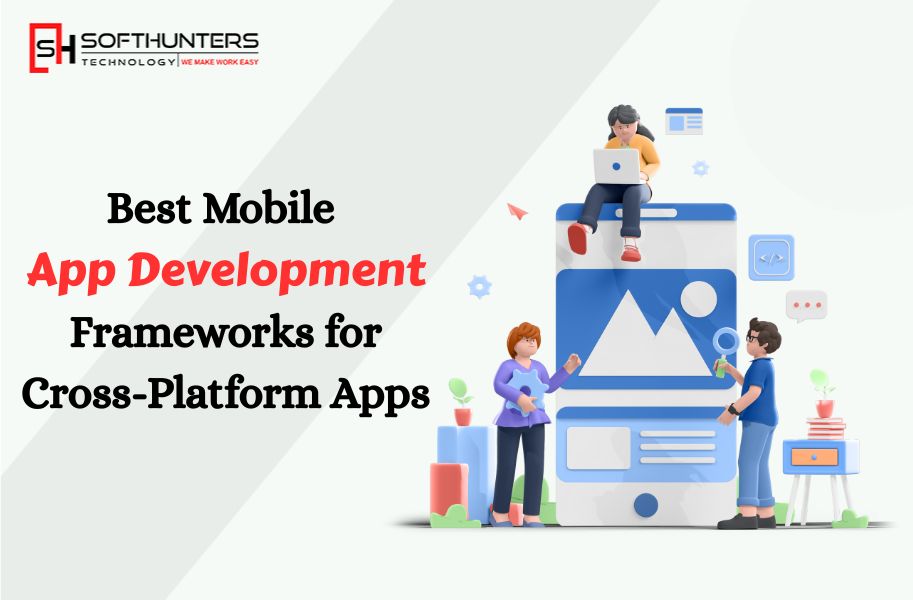In a revolutionary digital world, with mobile usage still on the rise, you cannot afford to overlook mobile applications in business. Building native apps on Android and iOS individually may be time-consuming and expensive, though. That is where cross-platform app development applies.
Cross-platform frameworks enable developers to write code that runs on multiple platforms. This not only saves both time and effort but also guarantees faster time-to-market and less maintenance expenses. Instead of hiring a Mobile App Development Company and getting an app developed to your specifications, a reliable cross-platform development can be tied up to arm your business with a competitive edge in no time.
In this blog, we discuss the best mobile application development frameworks for developing cross-platform apps in 2025, their advantages, and how the leading Mobile App Development frameworks utilize them to provide high-quality apps on mobile devices.
Why Choose Cross-Platform App Development?
Willingly to immerse ourselves in the world of frameworks, first of all, we should know why it is valuable to develop a cross-platform application:
- Cost Efficiency: Android and iOS share a single codebase, which makes it cheaper to develop and maintain.
- Acceleration Development: Faster app development gives developers the capacity to develop more and more efficiently.
- Greater Exposure: Publish to both the Android and iOS markets.
- Uniform UI/UX: Common parts and patterns provide a user experience.
- Eased Testing: One codebase equates to fewer defects and lessened QA.
Such advantages are the reasons why cross-platform solutions are the best options for businesses that want to move to mobile solutions, particularly where a professional Mobile App development agency is involved.
1. Flutter
Created by: Google
Programming Languages Dart
Flutter has bewildered the world of developers. It enables the creation of cool native-like applications based on a single codebase. Google has not stopped supporting it, and with the current community, it has become the default framework to use in most app development projects in the year 2025.
Key Features:
- Hot reload accelerates the process of development and debugging.
- Provides a custom rendering engine to support a consistent UI on cross platforms.
- Beautiful design widgets.
- Great experience with native applications.
One of the best mobile app development companies prefers to use Flutter, where the customer has specifications to be made with a beautiful User Interface, high velocity, and so short in deployment. It is especially trendy when it comes to e-commerce, travel, and finance applications in which design plays a crucial part.
2. React Native
Meta (Facebook) develops it.
Used Languages: JavaScript, JSX
React Native continues to be an authoritative platform for cross-platform app development. It is simple to adopt and, in most cases, it can also be used with the native modules, enabling it to achieve hybrid functionality where required.
The Reason Developers Love:
- Compatible React components on both Android and iOS.
- Flexible compatibility with third-party add-ons.
- A big and lively group of adherents.
- The open-source is frequently updated.
As a business application, social media platform, and media streaming application building service, react-native is applied in many Mobile App development services. It offers accelerated development cycles and high performance, particularly with apps that are content-heavy.
3. Xamarin
Created by: Microsoft
Programming languages: C
Xamarin is entered in the technology preferences of enterprises, as it performs like a native and is secure. It enables developers to have more than 90 percent of cross-platform code sharing and is entirely compatible with the Microsoft ecosystem.
Notable Features:
- Support of native APIs with C.
- High-performance native constructions.
- Good tooling assistance with the help of Visual Studio.
- Perfect to use when it comes to apps that need enterprise-level backend services.
An experienced Mobile App Development Company can advise Xamarin to those clients who already use .NET or need close integration with Microsoft services such as Azure or Active Directory.
4. Ionic
Programming Languages: HTML, CSS, JavaScript (Angular, React, Vue)
Ionic is a framework used to create hybrid apps that enable developers to create mobile, desktop, and web apps using web technologies. It is very simple and flexible to be used by startups and MVPs.
Top Benefits:
- An abundant collection of UI components.
- Angular, React, or Vue works.
- Fits in native features through Capacitor or Cordova.
- It can also be found in building Progressive Web Apps (PWAs).
An Ionic framework is more frequently used in a good Mobile App development agency when a rapid turnaround is key or when customers need a web-first style of creating mobile apps.
5. NativeScript
Frameworks: TypeScript, JavaScript, plug-in-based: Angular, Vue
NativeScript allows direct access to native APIs with JavaScript/TypeScript, which negates the usage of WebViews. This translates to improved performance and native-like responsiveness.
The Reason It is Outstanding:
- Native performance.
- Access to platform APIs directly.
- No browser/WebView dependency.
- Suitable for complicated applications that require native abilities.
NativeScript meets the interest of companies that require versatility and performance but are willing to use JavaScript instead of platform-specific languages.
6. Cordova (PhoneGap)
Programs used: HTML, CSS, JavaScript
Cordova was perhaps one of the earliest frameworks to open the doors to hybrid app development. Although currently obsolete to achieve the high performance of intensive apps, it remains a viable option for simpler apps and prototypes.
Pros:
- Web developers can easily use it.
- Big plugin ecosystem.
- Easy installation and implementation.
Most companies in the Mobility App development industry, however, have shifted to less lagging frameworks such as Flutter or React Native to improve the performance and experience of the application.
The way of Mobile App Development Services to succeed
The service of Professional Mobile App development is not all about coding. These are what they offer:
- Strategic Planning: Setting objectives, user flows, and main features.
- Design Skills: Making UI/UX that fits your audience.
- Custom Development: the use of an optimal framework to tailor it to your objectives.
- Testing & QA: Performance, compatibility, and usability.
Deployment & Support: Placing on app stores and keeping it post-launch.
When you partner with a good Mobile App Development Company, you will be assured that your app is well-received by its users and it will work efficiently across devices as well as grow with your business
Cross-Platform App Development in the Future
Cross-platform frameworks have never been more effective and efficient than in the year 2025. Provided with constant updates, a rise in performance, and better integration with native capabilities, they now have the potential to run apps that millions of people use.
These frameworks can also support the use of the latest technologies such as AI integration, AR/VR, and IoT. One of the well-planned Mobile App development agencies will guide you toward the incorporation of such trends whilst ensuring performance and user experience are given high priority.
Final Thoughts
The use of cross-platform development in the mobile environment has not become a cheap way out, but a tool that fully satisfies the requirements of the contemporary business. Are you going to develop an e-commerce app, a fitness tracker, or a business dashboard? The choice of framework is very important.
Such frameworks as Flutter, React Native, Xamarin, and Ionic have already demonstrated their value in various sectors of the business and remain in vogue in the mobile application market. Under the direction of a capable Mobile App Development Company, you can realize the full potential of these tools and make sure your app will be noticed in the dense market.
And, of course, when you are preparing to develop a cross-platform application, you should not do it on your own. Find a Mobile App Development Company with proper experience to bring your vision to life as a scalable and high-performing digital product.







